考研热作文
专四英语作文考研热
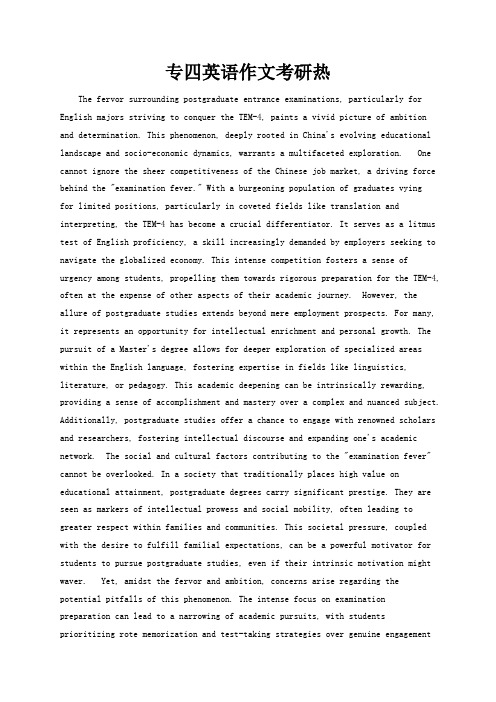
专四英语作文考研热The fervor surrounding postgraduate entrance examinations, particularly for English majors striving to conquer the TEM-4, paints a vivid picture of ambition and determination. This phenomenon, deeply rooted in China's evolving educational landscape and socio-economic dynamics, warrants a multifaceted exploration. One cannot ignore the sheer competitiveness of the Chinese job market, a driving force behind the "examination fever." With a burgeoning population of graduates vyingfor limited positions, particularly in coveted fields like translation and interpreting, the TEM-4 has become a crucial differentiator. It serves as a litmus test of English proficiency, a skill increasingly demanded by employers seeking to navigate the globalized economy. This intense competition fosters a sense of urgency among students, propelling them towards rigorous preparation for the TEM-4, often at the expense of other aspects of their academic journey. However, the allure of postgraduate studies extends beyond mere employment prospects. For many, it represents an opportunity for intellectual enrichment and personal growth. The pursuit of a Master's degree allows for deeper exploration of specialized areas within the English language, fostering expertise in fields like linguistics, literature, or pedagogy. This academic deepening can be intrinsically rewarding, providing a sense of accomplishment and mastery over a complex and nuanced subject. Additionally, postgraduate studies offer a chance to engage with renowned scholars and researchers, fostering intellectual discourse and expanding one's academic network. The social and cultural factors contributing to the "examination fever" cannot be overlooked. In a society that traditionally places high value on educational attainment, postgraduate degrees carry significant prestige. They are seen as markers of intellectual prowess and social mobility, often leading to greater respect within families and communities. This societal pressure, coupled with the desire to fulfill familial expectations, can be a powerful motivator for students to pursue postgraduate studies, even if their intrinsic motivation might waver. Yet, amidst the fervor and ambition, concerns arise regarding thepotential pitfalls of this phenomenon. The intense focus on examinationpreparation can lead to a narrowing of academic pursuits, with studentsprioritizing rote memorization and test-taking strategies over genuine engagementwith the English language and its cultural richness. This can stifle creativity and critical thinking, essential skills for navigating the complexities of the modern world. Moreover, the pressure-cooker environment of postgraduate entrance examinations can take a toll on students' mental health and well-being, leading to anxiety, burnout, and a sense of disillusionment. Therefore, it is crucial to strike a balance. While acknowledging the importance of the TEM-4 and postgraduate studies as pathways to career advancement and personal growth, we must advocatefor a holistic approach to education. This entails fostering a genuine love for the English language, encouraging intellectual curiosity beyond the confines of examinations, and prioritizing the mental and emotional well-being of students. By nurturing a passion for learning and fostering a supportive academic environment, we can ensure that the pursuit of postgraduate studies becomes a fulfilling journey of self-discovery and intellectual exploration, rather than a mere means to an end.。
我对考研热的看法英语作文
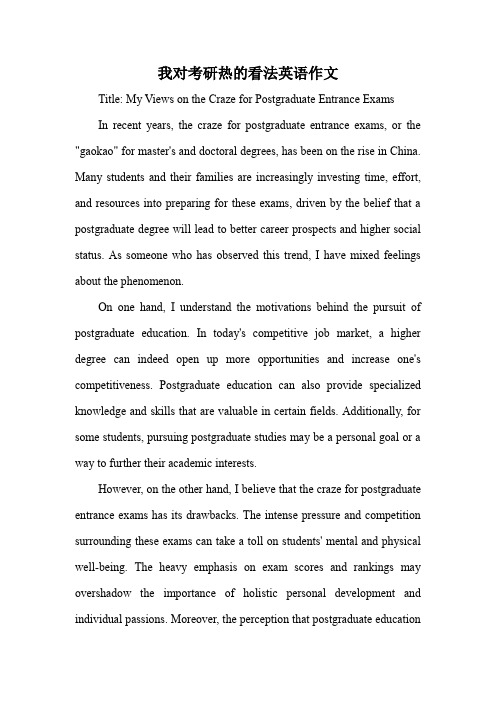
我对考研热的看法英语作文Title: My Views on the Craze for Postgraduate Entrance ExamsIn recent years, the craze for postgraduate entrance exams, or the "gaokao" for master's and doctoral degrees, has been on the rise in China. Many students and their families are increasingly investing time, effort, and resources into preparing for these exams, driven by the belief that a postgraduate degree will lead to better career prospects and higher social status. As someone who has observed this trend, I have mixed feelings about the phenomenon.On one hand, I understand the motivations behind the pursuit of postgraduate education. In today's competitive job market, a higher degree can indeed open up more opportunities and increase one's competitiveness. Postgraduate education can also provide specialized knowledge and skills that are valuable in certain fields. Additionally, for some students, pursuing postgraduate studies may be a personal goal or a way to further their academic interests.However, on the other hand, I believe that the craze for postgraduate entrance exams has its drawbacks. The intense pressure and competition surrounding these exams can take a toll on students' mental and physical well-being. The heavy emphasis on exam scores and rankings may overshadow the importance of holistic personal development and individual passions. Moreover, the perception that postgraduate educationis a guarantee of success may lead to unrealistic expectations and disappointment if the desired outcomes are not achieved.In my opinion, while postgraduate education can be a valuable pursuit, it should not be seen as the only path to success or fulfillment. It is essential for individuals to carefully consider their own goals, interests, and capabilities before deciding whether to pursue postgraduate studies. It is also important to maintain a healthy balance between academic pursuits and other aspects of life, such as relationships, hobbies, and personal well-being.In conclusion, while I recognize the benefits of postgraduate education, I believe that the craze for postgraduate entrance exams should be approached with a balanced perspective. It is crucial for individuals to make informed decisions based on their own values and aspirations, rather than simply following societal expectations or trends. Ultimately, success and fulfillment come from pursuing goals that are meaningful and aligned with one's personal values and passions.。
考研热或者疯狂考研写一篇英语作文

The Phenomenon of Crazy Postgraduate Entrance Examination FeverIn recent years, the craze for postgraduate entrance examination has reached unprecedented heights in China. This phenomenon, often referred to as "crazy postgraduate entrance examination fever," has become a topic of intense discussion among the education community and society at large. As the competition for university placements becomes increasingly fierce, students are willing to go to any lengths to secure a spot in a prestigious graduate program. The root causes of this fever can be traced to multiple factors. Firstly, the ever-growing demand for higher education in China has led to a significant increase in the number of students applying for postgraduate programs. This has created a highly competitive environment where students are required to score exceptionally high marks just to secure a place. Secondly, the perception that a postgraduate degree will lead to better job opportunities and higher salaries has further fueled the mania. Intoday's competitive job market, having a postgraduatequalification often gives individuals an edge over their peers.However, this craze for postgraduate entrance examination has also given rise to several concerns. One of the primary worries is the immense pressure that students face during this period. The relentless pursuit of high scores often leads to excessive stress and anxiety, affecting their mental health and overall well-being. Additionally, the intense competition can lead to unethical practices such as cheating and plagiarism, which not only undermine the integrity of the examination system but also harm the reputation of the participating institutions.Moreover, the focus on postgraduate entrance examination scores often overshadows other important aspects of education. The emphasis on scoring high marks can lead to a narrow and one-sided approach to learning, where students neglect other valuable skills such ascritical thinking, problem-solving, and communication. This can have long-term negative impacts on their personal and professional development.To address these concerns, a balanced approach towards postgraduate education is necessary. Firstly, institutions should strive to create a more inclusive and diverse learning environment that caters to the needs and interests of a wide range of students. This can be achieved by offering a variety of courses and programs that cater to different fields and disciplines. Secondly, emphasis should be placed on fostering a healthy learning culture that promotes critical thinking, innovation, and collaboration. This will help students develop a broad range of skillsthat are essential for their future success.In conclusion, the craze for postgraduate entrance examination fever is a complex phenomenon that requires a nuanced understanding and approach. While the pursuit of higher education is indeed admirable, it is crucial to strike a balance between academic achievements and personal well-being. By fostering a healthy learning culture and promoting a more inclusive and diverse educational environment, we can ensure that the next generation of leaders and innovators is well-prepared to face the challenges of the future.**疯狂考研热现象**近年来,考研热潮在中国达到了前所未有的高度。
考研热潮英语作文
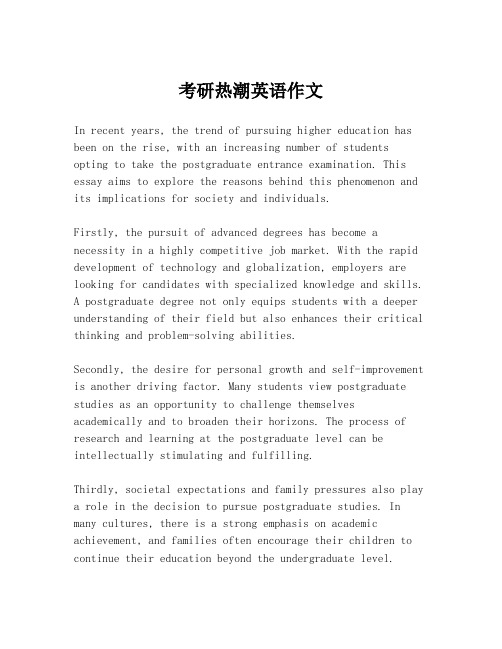
考研热潮英语作文In recent years, the trend of pursuing higher education has been on the rise, with an increasing number of students opting to take the postgraduate entrance examination. This essay aims to explore the reasons behind this phenomenon and its implications for society and individuals.Firstly, the pursuit of advanced degrees has become a necessity in a highly competitive job market. With the rapid development of technology and globalization, employers are looking for candidates with specialized knowledge and skills.A postgraduate degree not only equips students with a deeper understanding of their field but also enhances their critical thinking and problem-solving abilities.Secondly, the desire for personal growth and self-improvement is another driving factor. Many students view postgraduate studies as an opportunity to challenge themselves academically and to broaden their horizons. The process of research and learning at the postgraduate level can be intellectually stimulating and fulfilling.Thirdly, societal expectations and family pressures also play a role in the decision to pursue postgraduate studies. In many cultures, there is a strong emphasis on academic achievement, and families often encourage their children to continue their education beyond the undergraduate level.However, the postgraduate entrance examination craze also brings about certain challenges. The intense competition for limited spots can lead to stress and anxiety among students. Additionally, the focus on exams may overshadow the importance of genuine interest and passion for the subject of study.In conclusion, the craze for postgraduate entrance examinations reflects the changing dynamics of the job market and societal values. While it is important to recognize the benefits of advanced education, it is equally crucial to ensure that the pursuit of postgraduate studies is driven by genuine interest and not solely by external pressures.。
考研热原因英语作文

考研热原因英语作文The reason why many people are enthusiastic about taking the postgraduate entrance examination is that they want to pursue further study and improve their academic qualifications. This is especially true for those who hope to enhance their competitiveness in the job market or to gain more professional knowledge in their field.Another reason is that preparing for the postgraduate entrance examination provides an opportunity for individuals to review and consolidate their undergraduate knowledge. Many people believe that the process of preparing for the examination can help them to better understand the subjects and improve their academic abilities.Moreover, for some individuals, the postgraduate entrance examination is a way to challenge themselves and prove their capabilities. They see it as a personal achievement and a test of their determination andperseverance. They believe that successfully passing the examination will bring them a sense of accomplishment and pride.In addition, the increasing demand for high-level talents in various industries has also driven thepopularity of the postgraduate entrance examination. Many employers prefer candidates with postgraduate degrees, and this has motivated more people to pursue further study through the examination.Furthermore, the influence of social and family expectations cannot be ignored. In some cultures, obtaining a postgraduate degree is considered a symbol of success and a way to gain respect and recognition from others. This social pressure can also contribute to the enthusiasm for the postgraduate entrance examination.In conclusion, the reasons for the enthusiasm for the postgraduate entrance examination are diverse and complex. It is a combination of personal aspirations, academicambitions, career prospects, social expectations, and the demand for high-level talents in the job market.。
考研热英语作文
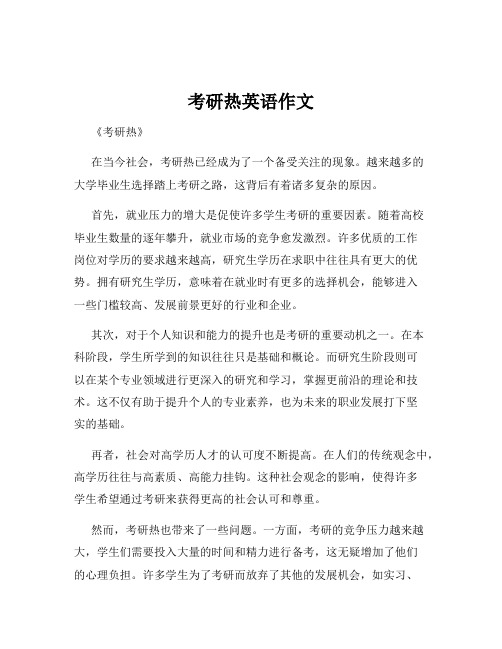
考研热英语作文《考研热》在当今社会,考研热已经成为了一个备受关注的现象。
越来越多的大学毕业生选择踏上考研之路,这背后有着诸多复杂的原因。
首先,就业压力的增大是促使许多学生考研的重要因素。
随着高校毕业生数量的逐年攀升,就业市场的竞争愈发激烈。
许多优质的工作岗位对学历的要求越来越高,研究生学历在求职中往往具有更大的优势。
拥有研究生学历,意味着在就业时有更多的选择机会,能够进入一些门槛较高、发展前景更好的行业和企业。
其次,对于个人知识和能力的提升也是考研的重要动机之一。
在本科阶段,学生所学到的知识往往只是基础和概论。
而研究生阶段则可以在某个专业领域进行更深入的研究和学习,掌握更前沿的理论和技术。
这不仅有助于提升个人的专业素养,也为未来的职业发展打下坚实的基础。
再者,社会对高学历人才的认可度不断提高。
在人们的传统观念中,高学历往往与高素质、高能力挂钩。
这种社会观念的影响,使得许多学生希望通过考研来获得更高的社会认可和尊重。
然而,考研热也带来了一些问题。
一方面,考研的竞争压力越来越大,学生们需要投入大量的时间和精力进行备考,这无疑增加了他们的心理负担。
许多学生为了考研而放弃了其他的发展机会,如实习、社交等,这在一定程度上限制了他们的综合发展。
另一方面,部分学生考研的目的不明确,只是盲目跟风,这不仅浪费了时间和精力,也可能导致在研究生阶段无法真正投入到学习和研究中。
为了应对考研热带来的问题,学生们需要更加理性地看待考研。
在决定考研之前,应该充分考虑自己的职业规划、兴趣爱好以及自身的能力和条件。
不要仅仅因为就业压力或者盲目跟风而选择考研。
同时,高校和社会也应该为学生提供更多的职业指导和发展机会,帮助他们树立正确的就业观和价值观。
对于高校来说,应该不断优化本科教育,提高本科教学质量,让学生在本科阶段就能获得足够的知识和能力,以更好地适应社会的需求。
此外,高校还应该加强对学生的职业规划教育,引导学生根据自身的情况做出合理的选择。
考研热产生的影响英语作文

考研热产生的影响英语作文In recent years, the craze for the postgraduate entrance examination, commonly known as "kaoyan," has been on the rise in China. This trend has generated significant impacts on various aspects of society, ranging from educational policies to individual career choices. The intense competition surrounding the examination reflects the high value placed on academic qualifications in Chinese culture and the pressure to succeed in a rapidly changing job market.Firstly, the kaoyan craze has led to significant changes in educational policies and practices. Universities and research institutions have responded to the demand by expanding postgraduate programs and increasing the number of available spots. However, this expansion has also led to concerns about the quality of education, as institutions struggle to maintain high standards while accommodating a larger student body. Furthermore, the focus on postgraduate education has overshadowed the importance of undergraduate studies, potentially leading to a dilution of the overall quality of higher education in the country.Secondly, the kaoyan craze has had profound effects on individual career choices. Many students view postgraduate studies as a prerequisite for secure employment in competitive industries such as finance, technology, and healthcare. As a result, they forego valuable work experience and networking opportunities in order to focus on preparing for the exam. This obsession with academic qualifications can sometimes lead to a mismatch between individuals' skills and interests and the demands of the job market, resulting in career dissatisfaction and a浪费of talent.Moreover, the intense competition and high stakes associated with the kaoyan have taken a toll on students' mental health. The pressure to perform well can lead to anxiety, depression, and even physical illness. The constant comparison with peers and the expectation to excel can be debilitating, particularly for those who do not fare well in the exam. This competitive environment can also foster a culture of elitism and elitism, where success is equated solely with academic achievements.In addition, the kaoyan craze has given rise to amulti-billion-dollar industry centered on exam preparation. Tutoring centers, online courses, and coaching institutes have proliferated, catering to the needs of students seeking to gain an edge in the competition. While these services may provide valuable resources and guidance, they also contribute to the commercialization of education and the creation of a two-tiered system where those who can afford expensive tutoring have an unfair advantage.Finally, the kaoyan craze reflects a deep-seated cultural value in China that equates success with academic achievements. This mindset can limit individuals' life choices and career aspirations, encouraging them to pursue academic paths that may not align with their interests or talents. The overemphasis on postgraduate studies can also lead to a brain drain as highly qualified individuals pursue opportunities abroad, often due to better pay and working conditions.In conclusion, the postgraduate entrance examination craze in China has had far-reaching impacts on society, education, and individual lives. While it反映s the highvalue placed on academic qualifications and the desire for success, it also暴露s the challenges and trade-offs involved in pursuing these goals. It is crucial for society to strike a balance between academic pursuits and other important aspects of personal and professional development, ensuring that education remains a tool for personal growth and societal progress.**考研热对中国社会的影响**近年来,考研热潮在中国持续升温。
专四英语作文考研热
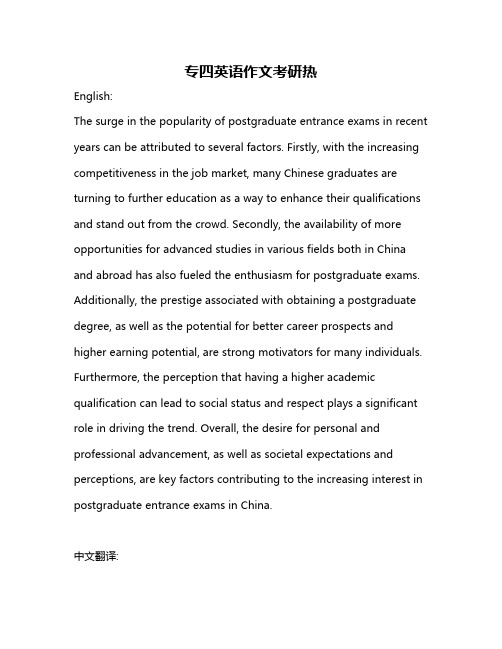
专四英语作文考研热English:The surge in the popularity of postgraduate entrance exams in recent years can be attributed to several factors. Firstly, with the increasing competitiveness in the job market, many Chinese graduates are turning to further education as a way to enhance their qualifications and stand out from the crowd. Secondly, the availability of more opportunities for advanced studies in various fields both in China and abroad has also fueled the enthusiasm for postgraduate exams. Additionally, the prestige associated with obtaining a postgraduate degree, as well as the potential for better career prospects and higher earning potential, are strong motivators for many individuals. Furthermore, the perception that having a higher academic qualification can lead to social status and respect plays a significant role in driving the trend. Overall, the desire for personal and professional advancement, as well as societal expectations and perceptions, are key factors contributing to the increasing interest in postgraduate entrance exams in China.中文翻译:近年来考研热的上涨可以归因于几个因素。
高考语文满分作文范例及解析--“考研热”的冷思考
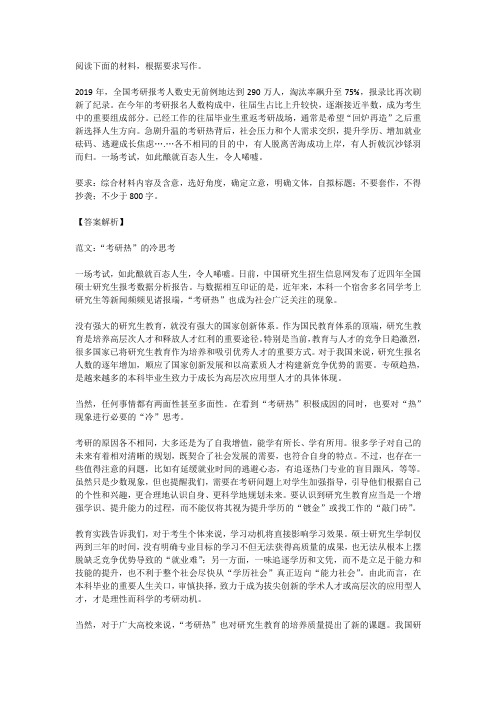
阅读下面的材料,根据要求写作。
2019年,全国考研报考人数史无前例地达到290万人,淘汰率飙升至75%,报录比再次刷新了纪录。
在今年的考研报名人数构成中,往届生占比上升较快,逐渐接近半数,成为考生中的重要组成部分。
已经工作的往届毕业生重返考研战场,通常是希望“回炉再造”之后重新选择人生方向。
急剧升温的考研热背后,社会压力和个人需求交织,提升学历、增加就业砝码、逃避成长焦虑….…各不相同的目的中,有人脱离苦海成功上岸,有人折戟沉沙铩羽而归。
一场考试,如此酿就百态人生,令人唏嘘。
要求:综合材料内容及含意,选好角度,确定立意,明确文体,自拟标题;不要套作,不得抄袭;不少于800字。
【答案解析】范文:“考研热”的冷思考一场考试,如此酿就百态人生,令人唏嘘。
日前,中国研究生招生信息网发布了近四年全国硕士研究生报考数据分析报告。
与数据相互印证的是,近年来,本科一个宿舍多名同学考上研究生等新闻频频见诸报端,“考研热”也成为社会广泛关注的现象。
没有强大的研究生教育,就没有强大的国家创新体系。
作为国民教育体系的顶端,研究生教育是培养高层次人才和释放人才红利的重要途径。
特别是当前,教育与人才的竞争日趋激烈,很多国家已将研究生教育作为培养和吸引优秀人才的重要方式。
对于我国来说,研究生报名人数的逐年增加,顺应了国家创新发展和以高素质人才构建新竞争优势的需要。
专硕趋热,是越来越多的本科毕业生致力于成长为高层次应用型人才的具体体现。
当然,任何事情都有两面性甚至多面性。
在看到“考研热”积极成因的同时,也要对“热”现象进行必要的“冷”思考。
考研的原因各不相同,大多还是为了自我增值,能学有所长、学有所用。
很多学子对自己的未来有着相对清晰的规划,既契合了社会发展的需要,也符合自身的特点。
不过,也存在一些值得注意的问题,比如有延缓就业时间的逃避心态,有追逐热门专业的盲目跟风,等等。
虽然只是少数现象,但也提醒我们,需要在考研问题上对学生加强指导,引导他们根据自己的个性和兴趣,更合理地认识自身、更科学地规划未来。
论考研热的作文

论考研热的作文《论考研热》篇一:《考研热,热得有点“上头”》现在这考研啊,就跟夏天的高温似的,热度蹭蹭往上涨。
走在街上,随便拉个人问问,保不准就和考研有点关系,要么自己考,要么身边有人考。
就说我那发小吧,之前那可是对学习没多大兴趣的主儿。
从大学毕业就找了个工作,按说过得也还凑合。
可就从去年开始,突然跟我说要考研了。
我当时都惊了,问他为啥呀。
他就开始给我倒苦水,说在公司啊,感觉一直都是个小喽啰,那些个升职加薪的机会看着都轮不到自己,为啥呢?人家那些研究生学历的就好像镀了层金,领导看着都不一样。
他这心里不平衡了,觉得自己也不比人差啊,就想回炉重造一下。
再看看现在的学习场所,那图书馆的自习室里,考研的人就像一群扎堆的小蚂蚁。
天刚蒙蒙亮就得去占座,要是去晚一点,连个放书的地儿都没有。
桌子上堆的书都像小山包一样。
每个人的脸上啊,要么是紧张兮兮,要么是麻木地学习,就跟被压榨的小苦瓜似的。
他们准备的那些材料,数都数不过来。
从各种考研机构的辅导书到自己打印的资料,感觉能把桌子给压垮。
而各个大学周围的考研租房也火起来了。
好多同学为了能有个安静的学习环境,都搬出来住了。
我那发小也是,在学校附近租了个小单间。
那屋子小得转身都得小心翼翼的,可就这他还宝贝得不行,把里面布置得跟学习的小天堂似的。
墙上贴满了各种励志的小纸条,什么“今天不吃学习的苦,明天吃生活的苦”之类的。
我去看他的时候,一进门就感觉那股学习的压力扑面而来,比屋里那股有点发霉的味儿还冲。
考研热啊,热得大家都有点失去理智了似的,都想挤进那个研究生的大门,好像进去了就真能一步登天似的。
篇二:《考研热背后的无奈与期待》还说我那发小吧。
自从他决定考研以后,整个人都变了个样儿。
以前特喜欢打游戏和逛街泡妞的那劲头啊,一下子就没了。
每次见到他,不是在背单词就是在做数学题。
他以前熬夜那都是为了玩,现在熬夜全是为了学习。
那黑眼圈重得像被人打了两拳似的。
他自己也说啊,这是在背水一战。
关于考研热的英语作文

The phenomenon of the Postgraduate Entrance Examination PGEE fever has been a topic of discussion in recent years.This trend reflects the aspirations of many students to further their education and enhance their competitiveness in the job market.Here are some key points that can be discussed in an essay about the PGEE fever:1.Economic Growth and Job Market:With the rapid development of the economy,there is an increasing demand for highly educated professionals.This has led to a surge in the number of students pursuing postgraduate studies to meet the qualifications for better job opportunities.cational Aspirations:Many students have a strong desire to deepen their knowledge and expertise in a particular field.Postgraduate studies offer them the chance to specialize and gain a deeper understanding of their chosen discipline.3.Academic Prestige:Attaining a masters or doctoral degree is often seen as a mark of academic achievement and can enhance an individuals prestige within their field.4.Personal Development:Postgraduate education provides an opportunity for personal growth and development.Students can refine their critical thinking skills,research abilities,and problemsolving techniques.ernment Policies:In some countries,the government encourages higher education by providing financial support,scholarships,and incentives for students to pursue postgraduate degrees.6.Global Competition:In the era of globalization,there is a growing need for individuals who can compete on a global scale.A postgraduate degree can provide the necessary qualifications and skills to do so.7.Career Advancement:For many professionals,a postgraduate degree is a stepping stone to career advancement.It can open doors to higher positions and better salaries. 8.Challenges and Considerations:While the PGEE fever has its benefits,it also brings challenges such as the financial burden of education,the pressure to succeed,and the potential for overqualification in certain fields.9.Alternatives to Traditional Postgraduate Studies:With the rise of online education and professional certifications,some students are exploring alternative paths to enhance their skills and qualifications without the need for a traditional postgraduate degree.10.The Future of Postgraduate Education:As the job market evolves,the value and necessity of postgraduate education may change.Its important to consider how postgraduate studies will adapt to meet the needs of future industries and job roles.In conclusion,the PGEE fever is a multifaceted issue that involves economic,social,and educational factors.Its essential for students to weigh the benefits and challenges of postgraduate education carefully before making a decision about their academic future.。
考研热潮的原因作文

考研热潮的原因作文
《考研热潮,为啥这么热?》
哎呀呀,现在考研可真是越来越热乎啦!为啥呢?听我给你唠唠哈。
就说我身边的事儿吧,我有个表姐,大学毕业找工作的时候可真是碰了一鼻子灰呀。
她去一家公司面试,那场面,乌泱泱的全是人,一个个都拿着厚厚的简历。
结果呢,人家面试官就瞟了两眼表姐的简历,就说等通知吧。
等啊等啊,到最后也没个影儿。
表姐就傻眼了,这才意识到,光有个大学文凭,现在真不顶啥事儿啊!后来她一咬牙,干脆决定考研,觉得这样能给自己加点砝码,以后找工作能更有竞争力。
你看,这找工作难不就是考研热的一个重要原因嘛!大家都想着,多学点知识,提高自己的学历,以后找个好工作的机会也能大点儿。
而且现在社会发展这么快,知识更新换代也快,不考研深造感觉都跟不上时代的步伐了呢。
还有啊,周围好多人都在考,看着人家都在努力提升自己,自己不考好像就落后了似的,心里也着急啊,就也跟风加入考研大军了。
反正呀,这考研热潮就是这么起来的。
我表姐现在正拼命复习呢,看着她那辛苦劲儿,我都有点心疼。
不过没办法呀,大家都为了自己的未来在奋
斗呢!考研虽然难,但也给了人们一个提升自我的机会,这也许就是它这么火热的魅力所在吧!哎,真希望表姐能考上,实现她的梦想,我也得好好努力,未来的路还长着呢!
总之,考研热这股风啊,还会继续刮下去,大家都为了自己的小目标在努力拼搏着,真是让人感叹呐!。
如何看待考研热英语作文

The Trend of Postgraduate Entrance Examination Fever: Perspectives and ReflectionsIn recent years, the trend of postgraduate entrance examination fever has been increasingly prevalent in China. More and more university graduates are choosing to further their studies by enrolling in master's programs, resulting in a significant increase in the number of applicants for postgraduate entrance exams. This phenomenon, often referred to as "graduate fever," deserves careful scrutiny, not only from an academic standpoint but also from a societal one.The Driving ForcesThere are numerous reasons why individuals choose to pursue postgraduate studies. Chief among them is the ever-growing demand for highly qualified professionals in today's competitive job market. A master's degree often serves as a credential that sets candidates apart from their peers, increasing their chances of securing a desirable job. Additionally, many professions, especially those in the fields of science, technology, engineering, and mathematics (STEM), require advanced degrees for entry-level positions.Furthermore, the pursuit of postgraduate studies is often driven by a desire for intellectual growth and personaldevelopment. Graduate programs offer the opportunity to delve deeper into specialized fields of study, acquire cutting-edge research skills, and establish oneself as an expert in a particular discipline. For many, the academic rigor and intellectual challenge of graduate studies are immensely rewarding.The ChallengesHowever, the trend of postgraduate entrance examination fever is not without its challenges. Firstly, the increasing number of applicants has led to a significant rise in the competitiveness of these exams. The admission rates to top universities and prestigious programs are becoming increasingly low, with some programs accepting only a fraction of the applicants. This has led to a great deal of anxiety and stress among aspiring graduate students.Secondly, the pursuit of a master's degree can be financially burdensome. Graduate studies often involve tuition fees, living expenses, and other costs that can be difficult to bear for many individuals. While some students are able to secure scholarships or financial aid, many others are forced to rely on loans or personal savings, which can place a significant financial strain on them and their families.Moreover, the rigorous nature of graduate studies can be emotionally draining. The demands of research, coursework, and examinations can be overwhelming, often leading to feelings of burnout and exhaustion. The pressure to publish and produce high-quality research can also be immense, adding to the emotional toll of graduate studies.A Balanced PerspectiveIt is crucial to view the trend of postgraduate entrance examination fever with a balanced perspective. While a master's degree can undoubtedly enhance one's employability and career prospects, it is not the only path to success. There are many other ways to achieve personal and professional growth, including professional development courses, online education, and industry-specific certifications.It is also important to consider the costs and benefits of postgraduate studies carefully. Individuals should assess their financial situation, personal interests, and career goals before making the decision to pursue a master's degree. They should also consider alternative options that may be more suitable for their needs and aspirations.In conclusion, the trend of postgraduate entrance examination fever reflects the changing demands andaspirations of modern society. While a master's degree can provide numerous benefits, it is not without its challenges. It is essential for individuals to approach this trend with a rational and balanced perspective, considering all factors carefully before making a decision that will shape their future.。
考研热产生的影响英语作文

考研热产生的影响英语作文English: The phenomenon of the surge in the number of people participating in the national postgraduate entrance examination, also known as the "考研热" (kaoyan fever) in China, has brought about various impacts on society. On one hand, the intense competition and pressure faced by candidates have led to a significant increase in the overall level of education in the country. As more individuals strive to pursue higher academic achievements, the quality of education and research in universities has been elevated. On the other hand, the "kaoyan fever" has also resulted in a series of challenges, such as the imbalance between supply and demand in the job market for postgraduates, the deterioration of mental health among candidates due to the stress of preparation, and the emergence of commercialized test-preparation services. Therefore, it is essential for both individuals and society to recognize the complexities of this trend and to address the underlying issues in order to ensure a sustainable and healthy development of the education system in China.Translated content: "中国参加国家研究生入学考试人数激增的现象,也被称为“考研热”,给社会带来了各种影响。
考研热产生的影响英语作文

考研热产生的影响英语作文题目:The Impact of Postgraduate Entrance ExaminationCrazeThe surging popularity of the Postgraduate EntranceExamination (commonly known as "the Gaokao for Master'sDegrees") in China has led to multifaceted impacts on society.Firstly, it reflects the increasing emphasis on higher educationand professional advancement. Many students pursuepostgraduate studies to enhance their career prospects andintellectual growth. Consequently, universities areexperiencing heightened enrollment rates, leading to morerigorous academic research and innovation. Secondly, theintense competition has fostered a culture of diligent studyand perseverance among students. However, this craze hasalso exacerbated exam-oriented pressures, potentiallyimpacting mental health and wellbeing. the growing demandfor postgraduate education prompts institutions to refine theirprograms and pedagogical approaches to meet societal needs,thereby shaping the future direction of tertiary education.题目:考研热带来的影响近年来在中国愈演愈烈的考研热现象对社会产生了多方面的影响。
考研热英语作文

考研热英语作文In recent years, there has been a significant surge in the number of students opting to take the postgraduate entrance exams, commonly known as the "kaoyan" in China. This phenomenon has sparked a heated debate about the reasons behind the trend and its implications for both theindividuals involved and the society at large.Firstly, the primary motivation for many students to undertake the postgraduate entrance exams is the pursuit of better career prospects. With the rapid development of the economy and the increasing competition in the job market, a higher degree has become a valuable asset that can set one apart from the crowd. Employers often place a premium on candidates with advanced degrees, as they are perceived to possess a deeper understanding of their field and the ability to tackle complex problems.Secondly, the desire for personal development and the pursuit of academic excellence are also driving factors. Many students are passionate about their field of study and wish to delve deeper into their subject matter. Postgraduate studies offer them the opportunity to engage in more advanced research and to contribute to the advancement of knowledge in their chosen discipline.However, the craze for postgraduate entrance exams is not without its drawbacks. The intense competition for limitedspots in prestigious universities can lead to immense pressure and stress among students. Additionally, there is a concern that the focus on obtaining a higher degree may overshadow the importance of gaining practical skills and work experience, which are equally critical in today's job market.Moreover, the rush to pursue postgraduate studies can lead to an oversupply of graduates in certain fields, potentially resulting in a glut of overqualified individuals competingfor a limited number of positions. This could lead to underemployment and dissatisfaction among the workforce.In conclusion, while the pursuit of higher education is commendable, it is essential for students to carefully consider their motivations and goals before embarking on the journey to postgraduate studies. It is also crucial for educational institutions and policymakers to address the challenges posed by the increasing popularity of postgraduate entrance exams, ensuring that the system remains equitable and beneficial for all stakeholders involved.。
考研热英语作文

考研热英语作文《考研热》在当今社会,考研已经成为了一股热潮,越来越多的大学生选择踏上考研之路。
这一现象背后有着复杂的原因和深远的影响。
首先,就业压力是促使许多学生选择考研的重要因素。
随着高校毕业生数量的逐年增加,就业市场竞争愈发激烈。
很多本科毕业生发现,想要找到一份理想的工作并非易事。
一些知名企业和热门岗位往往对学历有着更高的要求,研究生学历在求职中似乎更具优势。
拥有研究生学历,不仅可能增加进入大型企业、科研机构的机会,还可能获得更高的薪资待遇和更好的职业发展前景。
其次,对知识的追求也是不少学生考研的动力之一。
大学本科阶段的学习往往只是在某个领域打下了基础,对于那些对学术研究有着浓厚兴趣、渴望在专业领域深入探索的学生来说,考研是继续深造的必然选择。
通过研究生阶段的学习,他们能够接触到更前沿的学术成果,参与更深入的科研项目,从而提升自己的学术水平和研究能力。
再者,社会对高学历的推崇也在一定程度上推动了考研热。
在许多人的观念中,高学历意味着更高的社会地位和更广阔的发展空间。
这种社会氛围使得许多学生为了获得他人的认可和尊重,选择考研来提升自己的学历层次。
然而,考研热也带来了一些问题。
一方面,考研的竞争越来越激烈,学生们面临着巨大的压力。
为了备考,他们往往需要投入大量的时间和精力,放弃很多娱乐和休息的机会。
长时间的高强度学习可能导致身心健康问题,如焦虑、抑郁、失眠等。
另一方面,由于考研的人数众多,一些学生盲目跟风考研,没有明确的目标和规划。
他们在备考过程中缺乏动力和方向,最终即使考上了研究生,也可能因为对专业不感兴趣或者缺乏研究能力而无法顺利完成学业。
对于个人来说,在决定是否考研时,应该充分考虑自身的兴趣、职业规划和实际能力。
不能仅仅因为就业压力或者盲目跟风而选择考研。
如果对学术研究没有热情,或者只是为了逃避就业而考研,那么即使考上了,也可能在研究生阶段感到迷茫和痛苦。
对于高校和社会来说,也应该引导学生树立正确的考研观念。
高考作文素材:考研热

目录“考研”成“一个人的狂欢”,谁当反思? (1)“逃避式考研”只怕是理性社会人选择 (2)需要重新定义“逃避式考研” (5)“逃避式考研”,别把考研看得太容易 (7)别让考研反成人生掣肘 (9)“考研”成“一个人的狂欢”,谁当反思?2020年硕士研究生入学考试将进入100天倒计时。
逐年递增的报考人数、僧多粥少的录取比例、被标签化的“考研党”……这场数百万人参加的全国性考试,每一点微小的变化都会引起讨论。
有考研落榜者总结说:“如果说高考是一群人奋斗的记忆,那么考研多数情况下是一个人的狂欢”。
“考研热”到底有多热?据教育部统计数据显示:2016年考研报名人数为201万,但到了2018年,这一数字则上升到290万。
2019年暂未见相关统计数据公布,想必考研报名人数不会低于去年。
考研热持续高烧不退,有外部竞争压力因素,实则是人才评价机制、标准存有某种严重缺陷;也有个体选择背后的名校梦,以及毕业时的彷徨等。
但无论属哪种情况,均属一种急功近利或不属医学范畴的浮躁病,都要不得或都得治。
未来企事业之间、地区城市之间的竞争是人才之间的争夺。
谁抢占了人才“制高点”,谁就有可能成最大赢家。
这早已成为一句耳熟能详的流行语。
但引进高学历人才,究竟是为企事业单位、为政府部门所急需,还是纯属用来为企事业单位、政府部门装潢门面?或是企事业单位的随大流行为,抑或是一些政府部门出于某项工作的需要,以招聘为幌子,实则用来帮政府部门进行“变相公关”?诸如此类的问题,不能不引起一些企事业单位负责人乃至政府机关主政者高度重视。
另一方面,有了“海归”背景、硕士学位,就真的可以为自己增加就业机会的筹码么?恐怕也未必!前些年媒体公开报道的,在微软中国的一次人才招录中,来自河南南阳理工学院软件学院大专学历学生李文怡,打败与李文怡站在同一起跑线上的清华大学、浙江大学等知名大学的很多高学历毕业生,就比较能说明问题。
(2006年8月4日《现代快报》)。
如何看待考研热英语作文

如何看待考研热英语作文Here is an essay on the topic of how to view the fever of postgraduate entrance examination in English, with the text length exceeding 1000 words as requested.The fever of postgraduate entrance examination, also known as the "gaokao", has been a subject of intense discussion and debate in recent years. As a significant milestone in the academic and professional lives of many individuals, this examination has become a focal point of attention, sparking both enthusiasm and controversy. In this essay, we will delve into the various perspectives on the postgraduate entrance examination fever and explore the implications it holds for individuals, society, and the educational system.Firstly, it is important to recognize the driving forces behind the surge in postgraduate entrance examination participation. In many countries, a postgraduate degree is perceived as a gateway to better career opportunities, higher earning potential, and enhanced social status. The allure of a prestigious degree and the promise of a more secure future have led to a heightened demand for postgraduate education. This, in turn, has fueled the intense competition forlimited spots in postgraduate programs, resulting in the "fever" that has become a defining characteristic of the postgraduate entrance examination landscape.One of the primary arguments in favor of the postgraduate entrance examination fever is the potential for individual growth and advancement. Proponents of this view argue that the rigorous preparation and intense competition inherent in the examination process can foster valuable skills such as discipline, critical thinking, and problem-solving. These skills, they contend, are not only essential for success in postgraduate studies but also serve as a foundation for professional and personal development. Additionally, the achievement of a postgraduate degree can open doors to a wider range of career opportunities, potentially leading to higher salaries and greater job security.However, critics of the postgraduate entrance examination fever often highlight the potential downsides of this phenomenon. They argue that the intense focus on examination performance can lead to a narrow and often detrimental emphasis on rote learning and test-taking strategies, rather than the cultivation of deeper understanding and a genuine love for learning. This, in turn, can stifle the development of creativity, innovation, and the ability to think independently – qualities that are increasingly valued in the modern workforce.Furthermore, the relentless pursuit of postgraduate degrees can also have significant psychological and emotional consequences for individuals. The immense pressure to perform well on the examination, coupled with the uncertainty of securing a coveted spot, can lead to heightened levels of stress, anxiety, and burnout among aspiring postgraduate students. This can have adverse effects on their overall well-being and may even undermine their academic and professional potential in the long run.Another critical aspect to consider is the societal impact of the postgraduate entrance examination fever. In many countries, the intense competition for postgraduate programs has led to a widening of the educational and socioeconomic divide. Individuals from disadvantaged backgrounds may face significant barriers in accessing the resources and support necessary to excel in the examination, further exacerbating the existing inequalities in the educational system. This, in turn, can perpetuate a cycle of social stratification and limit the opportunities for social mobility.Moreover, the postgraduate entrance examination fever can also have broader implications for the educational system as a whole. The disproportionate emphasis on examination performance can lead to a distortion of educational priorities, with institutions and policymakers focusing more on examination preparation rather thanthe holistic development of students. This can result in a curriculum that is heavily skewed towards test-taking skills, rather than fostering critical thinking, creativity, and a genuine love for learning.In conclusion, the postgraduate entrance examination fever is a complex phenomenon that encompasses a range of perspectives and considerations. While the potential for individual growth and advancement is undeniable, the potential downsides, such as the psychological toll, the widening of educational and socioeconomic divides, and the distortion of educational priorities, cannot be overlooked. It is crucial for policymakers, educators, and individuals to engage in a thoughtful and nuanced dialogue to address the challenges posed by the postgraduate entrance examination fever and to develop a more balanced and holistic approach to education and career development. Only then can we ensure that the pursuit of postgraduate education serves as a catalyst for personal and societal progress, rather than a source of undue stress and inequality.。
- 1、下载文档前请自行甄别文档内容的完整性,平台不提供额外的编辑、内容补充、找答案等附加服务。
- 2、"仅部分预览"的文档,不可在线预览部分如存在完整性等问题,可反馈申请退款(可完整预览的文档不适用该条件!)。
- 3、如文档侵犯您的权益,请联系客服反馈,我们会尽快为您处理(人工客服工作时间:9:00-18:30)。
The Post-graduate Craze
In recent years, more and more college students take part in the entrance exams for postgraduate schools. According to statistics, (from ), 111,421 students in Henan province took these exams this year, adding 12,045 more than last year. Why do more and more college students take these exams? The main reason are students’ desires for changing their current learning situation, expectations and effects from others, and social employment pressure.
Firstly, students take the exams to change their current learning situation. Because of their dissatisfaction with their universities’academic environment and the difficulties of transferring to another university, many students choose to take the exams to another better university. Take me for example; I am an English major at Henan Polytechnic University. English, as a liberal art at my university, is less valued than at a foreign studies university. For instance, reference books and related courses for TEM4 and TEM8 are fewer than those of other foreign studies universities. Thus, our passing rate of TEM4 last semester of my university is about 50% while Shanghai International Studies University is about 95%. So, if I want to change my learning situation and learn further about English, taking the exams to a foreign studies university is my best choice.
Secondly, students take the exams because of the expectations and effects from others. According to , more and more parents expect their children to get the three degrees which are Bachelor Degree, Master Degree, and Doctor Degree. In parents’ eyes, these three degrees are their children’s employment security and life safeguard in the future. In order to live up to their parents’expectations and lessen their parents’ anxiety, many of students take the exams. What’s more, some students take part in the exams because many of their friends take the exams. For example, Lilu, one of my friends, did not want to take the exams at first. But most of her intimates took the exams. So, naturally they were busy preparing for the exams and had no time to accompany her like before. Recalling the wonderful time when they played together, she felt deserted and lonely. Besides, she had no idea about the direction of her future development. Gradually affected by them, she decided to take the exams.
Thirdly, students take the exams to find a job to make a living. Nowadays employment pressure is greater and greater in our country, so some college students can not find a job after graduation. For one thing, the number of college graduates is increasing, but the social employment opportunities are limited. For another, some companies only employ job-hunters who have a Master Degree. Take peoples insurance company of china for example; it requires its clerks having a Master Degree or a higher degree (from ). Under such circumstances, we students have no choice but to take the exams to get a higher degree.
Considering the above reasons discussed, we college students should make decisions on the basis of our own conditions and needs when facing to the exams for postgraduate schools. Only in this way can we get rid of being the victim of Post-graduate Craze and make our own life in the future better.。
